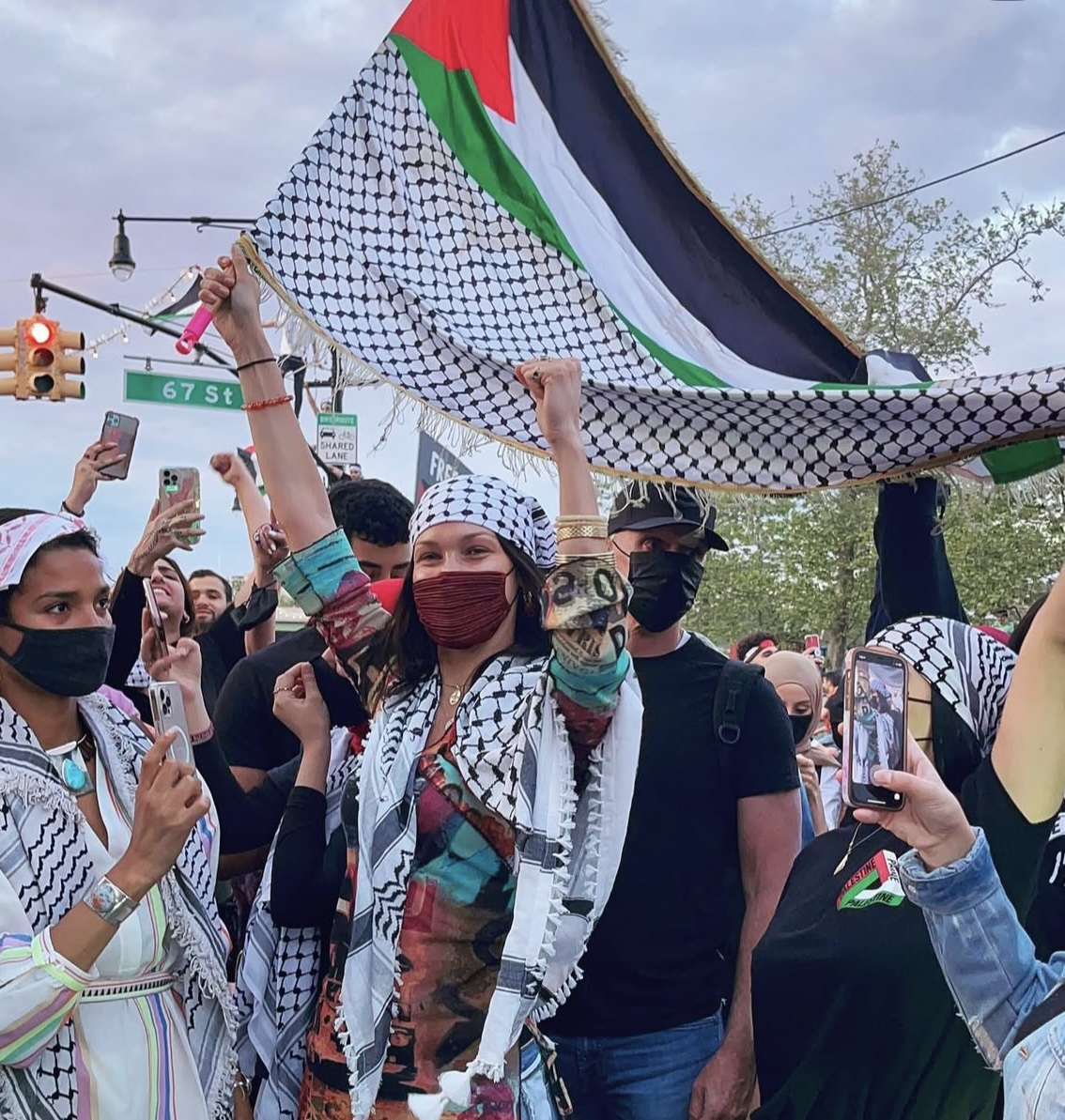- Reporter: Talya Aziz
- Editor: Nour El Badawi
In the early days of Israel’s war on Gaza, many turned to news outlets to understand what was happening. But a number also took to Instagram, waiting to see who among their favor- ite celebrities would speak up, who would stay silent, and what side they would take.
With important issues such as Ukraine, global warming, the death of Pope Francis, for example, many young people seek a moral clarity amid the media oversaturation and look for public figures to guide them in forming their opinions.
This is the reality of the social media age—many people have formed emo- tional attachments to their favorite celebrities. Most of the time, these one-sided relationships seem harm- less, but when morality, justice, and politics enter the frame, the influence celebrities hold becomes uncomfort- ably clear.
After the news broke out about the war on Gaza, many fans turned to Tay- lor swift, flooding her social media with comments asking her to speak about it, in hopes for moral guidance and indications of her own morality, however, when they were met with silence her fan’s attachment’s towards her lessened.
While some people feel satisfaction knowing that celebrities share the same opinion as them, for others, it’s not about being influenced, it’s about feeling seen.
“Celebrities don’t necessarily in- fluence my opinion, but when I find that their opinions match mine, I find a sense of validation,” said Nardeen Meligy, a business finance junior.
According to the 2024 Reuters In- stitute Digital News Report, trust in traditional news outlets has fallen in younger generations.
This highlights a broader question about how people determine who holds moral authority, an idea that varies widely across cultures and social contexts.
“There isn’t really a single tradition of where ethical authority comes from. People tend to assume that it comes from political leaders, from legal scholars, or maybe from specialized ethicists, but in a lot of societies, those aren’t distinct roles that are professionalized in that way,” says Manuel Schwab, an assistant professor of anthropology at AUC.
In some cases, people turn to dif- ferent sources, such as family or government figures, and sometimes to no one at all. Celebrities, he added, are simply another version of that choice.
The role of celebrities and social media influencers as activists was prominent during the genocide in Gaza. Across social media platforms, celebrity comment sections were filled with fans asking them to speak up about Gaza.
One of the most prominent exam- ples of celebrities taking on the roles of activists was rapper Macklemore. Macklemore released two protest songs named Hind’s Hall and Hind’s Hall 2, in honor of Hind Rajab, a 5-year-old Palestinian girl who was killed by Israeli forces. Macklemore donated all proceeds from the song to UNRWA (The United Nations Relief and Works Agency for Palestine Refugees).
“Me listening to an artist’s music or following an influencer on social media is me aiding their popularity, their stances reflect who they are as people, and I wouldn’t want to give a platform to the wrong people,” says Meligy.
However, this dynamic can also lead to public figures being held to somewhat unfair, or even unrealistic, expectations that exceed their roles, with disproportionate weight placed on their political opinions.
“It’s unrealistic to expect every ce- lebrity to become an expert and speak out on every political issue,” said Helen Rizzo, associate professor of Sociology.
“Some do the work and back their words with knowledge and evidence, but being an actor or a soccer player doesn’t automatically mean you should be a spokesperson for justice.”
Rizzo went on to explain that since not all celebrities take the time to do their research, and that one could simply just repost something without doing their research, basing opinions and morals on what public figures say can be shallow.
Many fans and audiences tend to overestimate the influence that celebri- ties hold. As a result, when celebrities speak out about an issue, such as those who have expressed support for Pales- tine, audiences may agree with their stance but still feel unsatisfied, ex- pecting stronger or more direct action.
A prime example of this is American singer and rapper Lizzo. She posted in support of Palestine and shared a donation link, noting that she had con- tributed and then encouraged others to do the same. This sparked backlash from some of her followers, who crit- icized her for asking fans to donate despite her status as a millionaire.
In 2018, Gen Z coined the term “cancel culture”, which refers to the idea of holding celebrities and social media influencers accountable for controversial actions they have done. ‘Cancelling’ could include boycotting and unfollowing, requesting public acknowledgements or apologies, and overall demoting their influence on the public.
“For Gen Z and social media, call- ing out and cancelling celebrities for speaking out or saying the wrong things are easy ways to be activists, as opposed to social movements and social movement organizations, which require a lot of work and organization,” Rizzo says.
During the peak coverage of the genocide in Gaza in late 2023 and 2024, there was a movement on social media called “Blockout 2024” where people mass-unfollowed celebrities who did not speak up about Gaza, yet attended events such as the Met Gala.
Which is known as a form of “easy activism”.
“In a certain sense, cancel culture has not been good for anyone because the result is that the smart career move is to be apolitical; it does say some- thing about how easily an opinion becomes a liability,” said Schwab.
In situations like these, many ce- lebrities and social media influencers resort to performative activism—only to keep up appearances and please an audience, regardless of whether they believe in the cause or are doing impactful work to their abilities.
